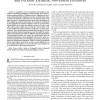Free Online Productivity Tools
i2Speak
i2Symbol
i2OCR
iTex2Img
iWeb2Print
iWeb2Shot
i2Type
iPdf2Split
iPdf2Merge
i2Bopomofo
i2Arabic
i2Style
i2Image
i2PDF
iLatex2Rtf
Sci2ools
TROB
2010
2010
Task-Specific Generalization of Discrete and Periodic Dynamic Movement Primitives
Abstract--Acquisition of new sensorimotor knowledge by imitation is a promising paradigm for robot learning. To be effective, action learning should not be limited to direct replication of movements obtained during training but must also enable the generation of actions in situations a robot has never encountered before. This paper describes a methodology that enables the generalization of the available sensorimotor knowledge. New actions are synthesized by the application of statistical methods, where the goal and other characteristics of an action are utilized as queries to create a suitable control policy, taking into account the current state of the world. Nonlinear dynamic systems are employed as a motor representation. The proposed approach enables the generation of a wide range of policies without requiring an expert to modify the underlying representations to account for different task-specific features and perceptual feedback. The paper also demonstrates that the proposed meth...
| Added | 22 May 2011 |
| Updated | 22 May 2011 |
| Type | Journal |
| Year | 2010 |
| Where | TROB |
| Authors | Ales Ude, Andrej Gams, Tamim Asfour, Jun Morimoto |
Comments (0)

